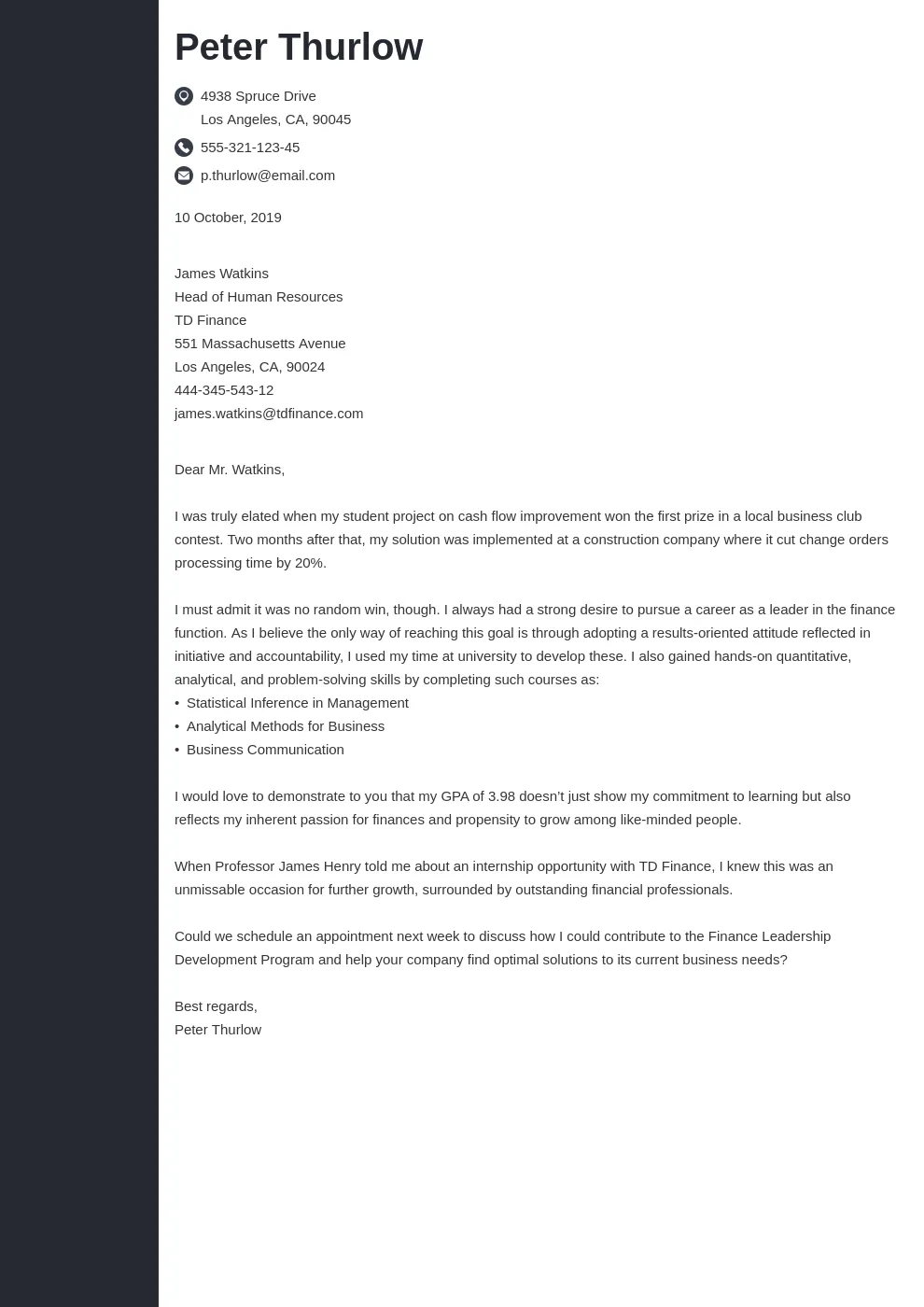Why a Cover Letter is Crucial for Internships
In the competitive world of internships, a well-crafted cover letter can be your golden ticket to landing your dream opportunity. Many applicants underestimate the importance of a cover letter, but it’s your chance to go beyond the bullet points of your resume and truly connect with the hiring manager. This document allows you to showcase your personality, enthusiasm, and specific qualifications in a way that a resume alone simply cannot. A strong cover letter provides context to your experiences, demonstrates your communication skills, and illustrates why you are the perfect fit for the internship and the company.
Showcasing Your Passion and Enthusiasm
One of the most critical elements of a successful internship cover letter is demonstrating your genuine passion for the field, the company, and the specific role. Don’t just list your skills; show your enthusiasm! Start by expressing your interest in the company and the internship opportunity, explaining what specifically attracts you to it. Share why you are excited about the prospect of contributing to their mission. This goes beyond generic statements; reference specific projects, company values, or recent news that resonates with you. Your goal is to make the reader understand that this internship is not just a job, but an opportunity you are genuinely excited about.
Highlighting Relevant Skills and Experiences
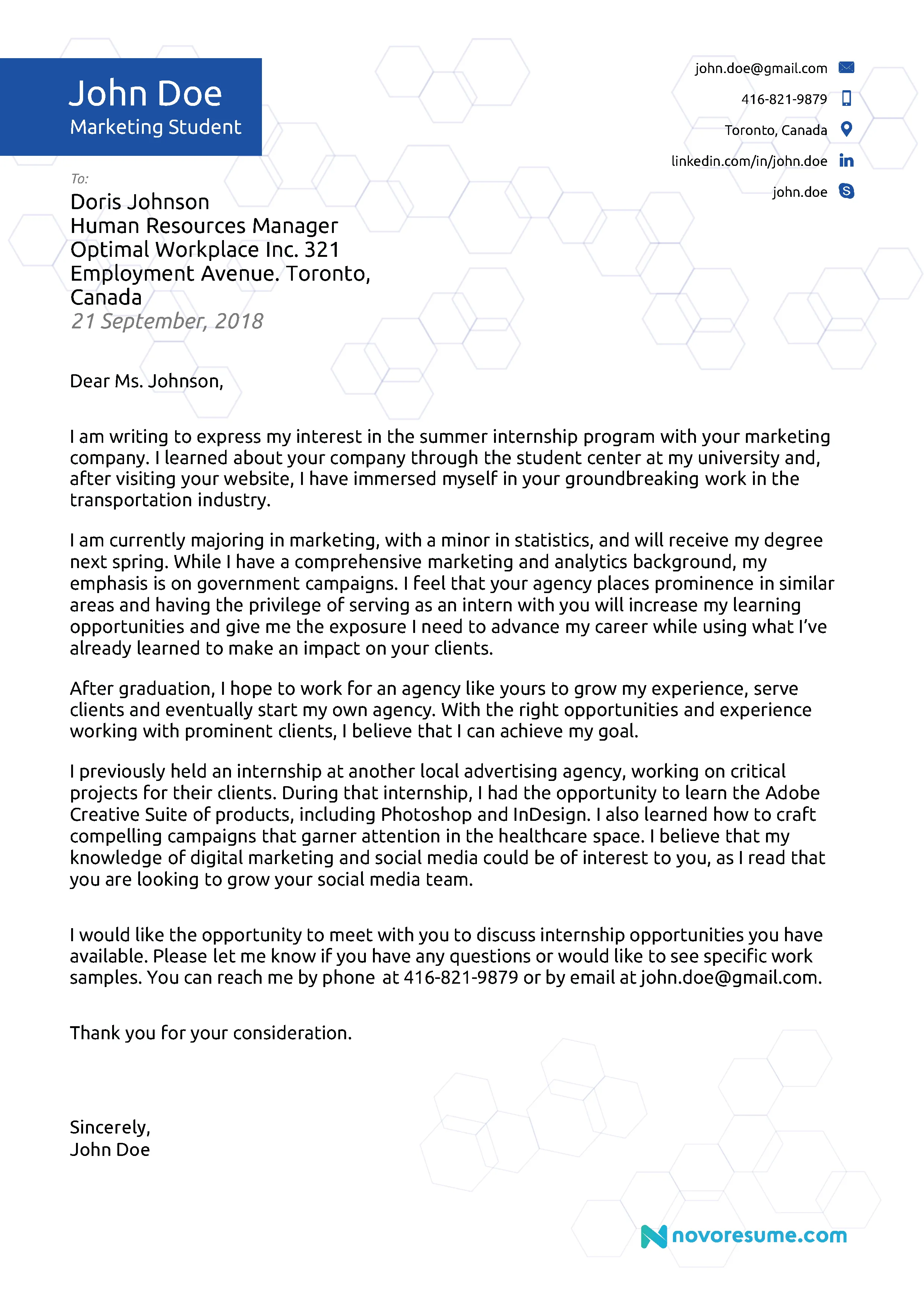
Your cover letter is your chance to connect your skills and experiences to the internship’s requirements. Carefully review the job description and identify the key skills and qualifications the company is seeking. Then, use your cover letter to highlight how your experiences align with those needs. Don’t just list your skills. Instead, provide specific examples of how you have used those skills in previous roles, projects, or academic endeavors. Use action verbs and quantifiable results to demonstrate the impact of your abilities. This might include detailing how you contributed to a project, solved a problem, or achieved a specific outcome. This targeted approach makes your application more compelling and demonstrates your understanding of what the company is looking for.
Tailoring the Cover Letter to the Internship
A generic cover letter is easily spotted and often disregarded. Tailoring your cover letter to each specific internship is an essential step in increasing your chances of success. This means more than just changing the company name; it involves researching the company, understanding the role, and demonstrating how your unique skills and experiences align with their specific needs. The more effort you put into personalizing your cover letter, the more likely you are to capture the hiring manager’s attention. Take the time to understand the company’s culture, values, and recent achievements and show them that you understand what the company is about.
Researching the Company and Role
Before you start writing, thoroughly research the company and the specific internship position. Visit the company’s website, read news articles, and explore their social media presence to understand their mission, values, and recent projects. Review the job description carefully to identify the key responsibilities, required skills, and desired qualifications. This research will not only help you tailor your cover letter but also demonstrate your initiative and genuine interest in the opportunity. The more you know about the company and the role, the better equipped you will be to explain why you are a good fit and what you can bring to the table.
Using Keywords from the Job Description
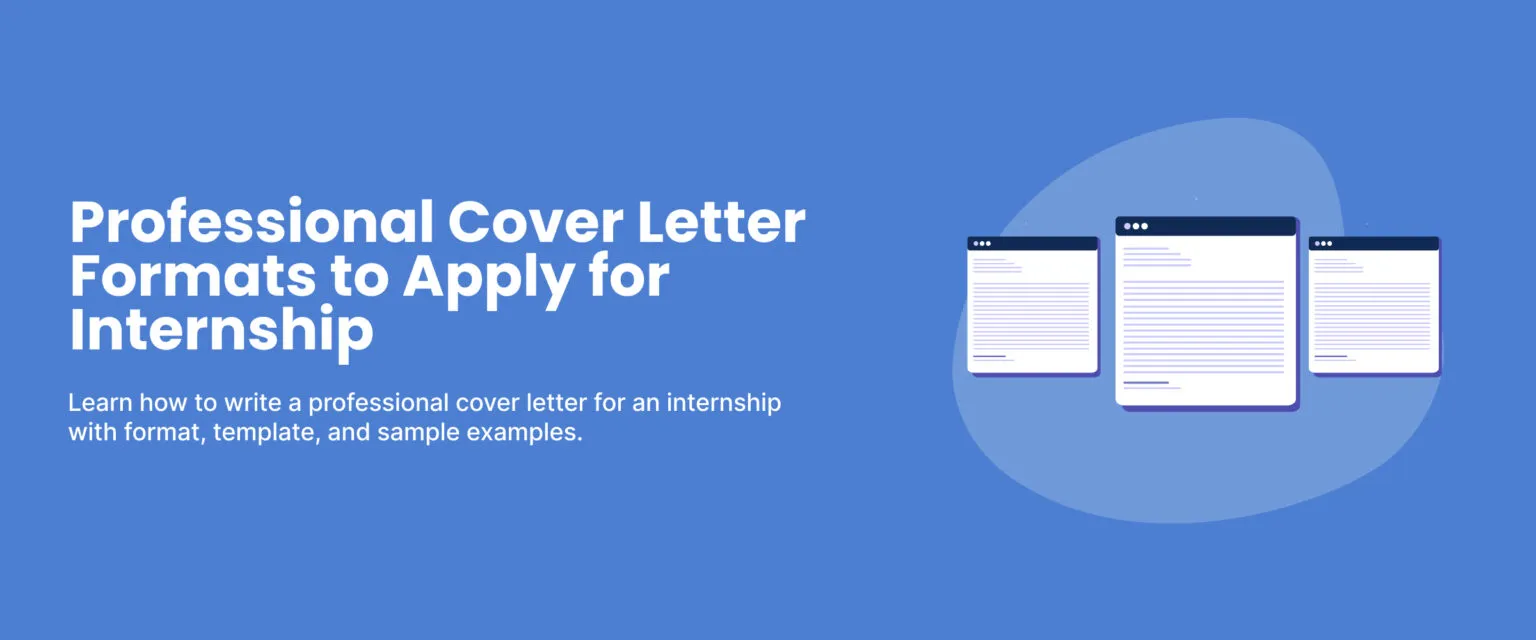
The job description is your roadmap. It contains the keywords and phrases that the company uses to describe the ideal candidate. Incorporate these keywords naturally throughout your cover letter. This will help the hiring manager quickly see that you meet the required qualifications. However, avoid keyword stuffing. Instead, weave these terms seamlessly into your sentences and paragraphs, highlighting your relevant skills and experiences. The goal is to show, not just tell, that you possess the skills the company is seeking. Use the same language as the job description, especially when describing your skills and experiences.
Demonstrating Your Value Proposition
Your cover letter is your chance to show the company what you can offer. Beyond simply listing your skills and experiences, you need to demonstrate your value proposition. Explain what you can bring to the team and how you can contribute to the company’s success. Think about your unique strengths, skills, and experiences, and how they align with the internship’s goals. Highlight your relevant skills, achievements, and any other unique qualities that set you apart from other applicants. This could include your ability to learn quickly, your problem-solving skills, your teamwork abilities, or your passion for the industry.
Quantifying Achievements and Contributions
Whenever possible, quantify your achievements and contributions with concrete data. Instead of saying ‘I improved customer service,’ say ‘I improved customer satisfaction scores by 15% by implementing a new feedback system.’ This level of detail makes your accomplishments more credible and demonstrates your impact. Use numbers, percentages, and specific results to showcase the value you brought to previous projects or roles. This could include anything from the number of projects you managed to the amount of money you saved or the number of clients you assisted. Quantifiable results immediately capture the reader’s attention and provide a clear understanding of your capabilities.
Providing Specific Examples of Skills
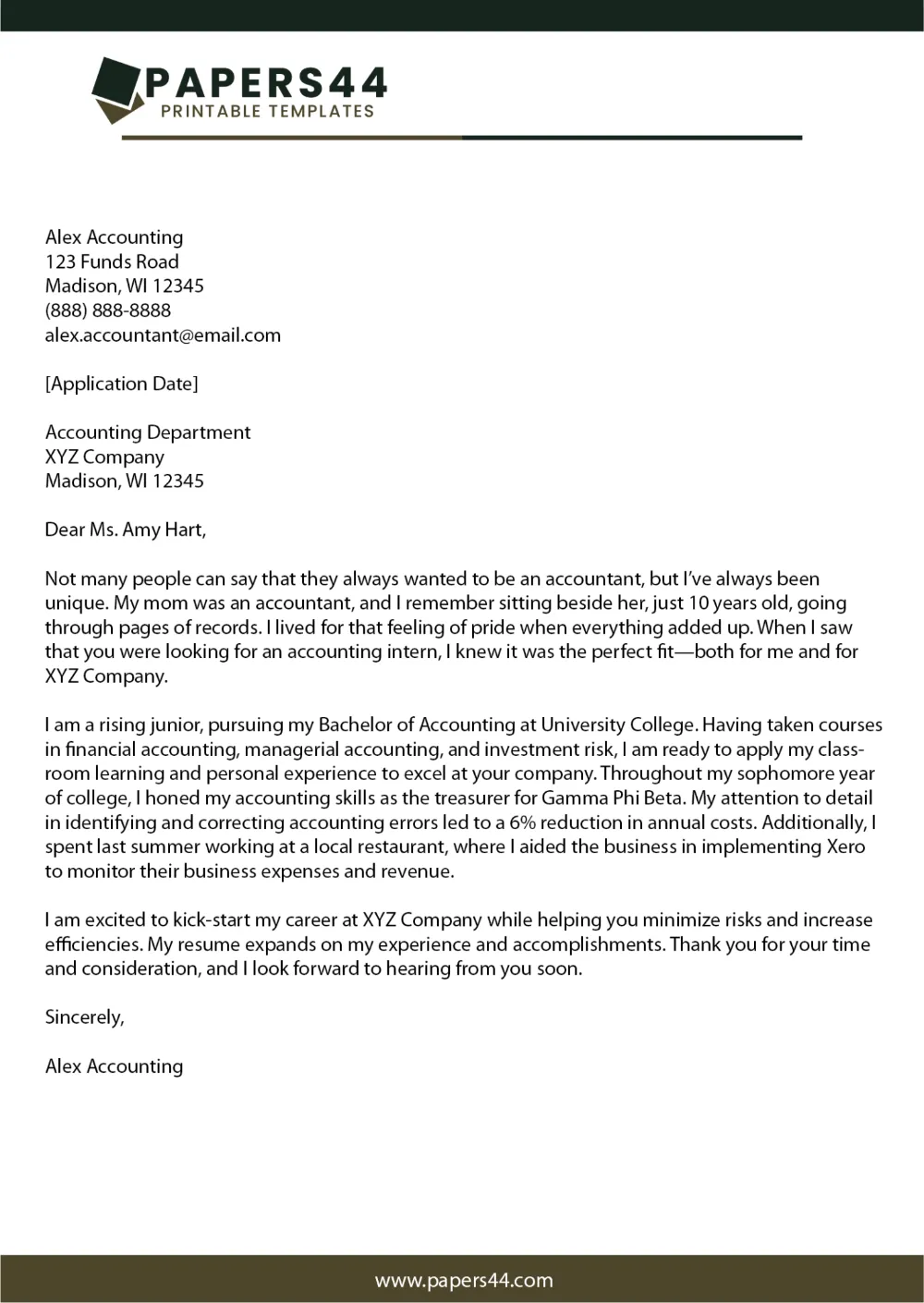
Instead of just listing your skills, provide specific examples of how you have used those skills in the past. For example, instead of saying ‘I have strong communication skills,’ describe a situation where you effectively communicated with a team, presented information to an audience, or resolved a conflict. Use the STAR method (Situation, Task, Action, Result) to structure your examples. Describe the situation, the task you needed to complete, the actions you took, and the result of your efforts. This approach provides concrete evidence of your skills and demonstrates your ability to apply them in real-world scenarios. Providing specific examples makes your cover letter more compelling and memorable.
Formatting and Proofreading Your Cover Letter
A well-formatted and error-free cover letter demonstrates professionalism and attention to detail. Poor formatting or grammatical errors can reflect negatively on your candidacy, regardless of how strong your skills and experience are. Your cover letter should be easy to read, well-organized, and free of any typos or grammatical errors. Pay close attention to the layout, font, and overall presentation of your cover letter. Make sure your contact information is accurate and up-to-date.
Formatting Guidelines for Internship Cover Letters
Use a professional font such as Times New Roman, Arial, or Calibri in a readable size (11 or 12 points). Maintain consistent formatting throughout the document, including margins, spacing, and paragraph alignment. Keep your cover letter concise, ideally within one page. Use clear headings and bullet points to organize information and make it easy for the hiring manager to scan. Ensure your contact information is at the top, including your name, phone number, email address, and LinkedIn profile (if applicable). Address the hiring manager by name whenever possible. The goal is to make your cover letter visually appealing and easy to navigate.
Proofreading and Editing Tips
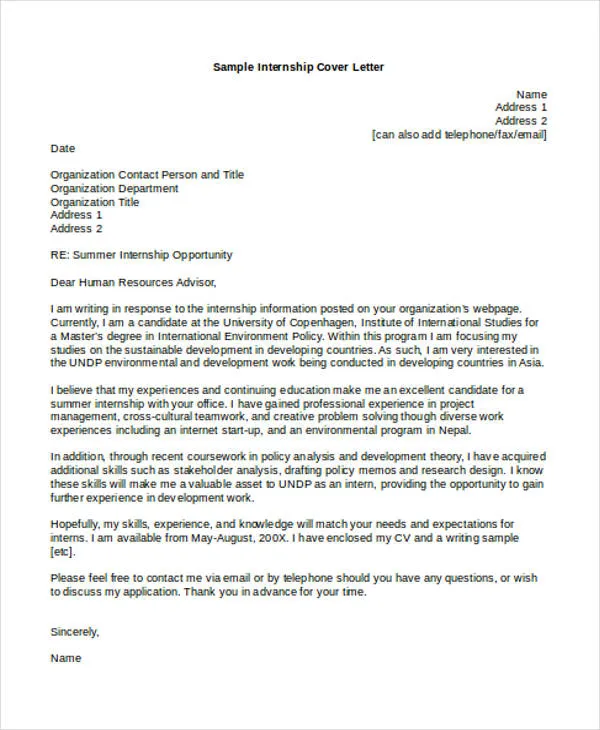
Thoroughly proofread and edit your cover letter before submitting it. Check for grammatical errors, typos, and awkward phrasing. Use a grammar checker and spell checker, but don’t rely on them entirely. Read your cover letter aloud to catch any errors. Ask a friend, family member, or career counselor to review your cover letter for feedback. They can provide a fresh perspective and help identify any areas for improvement. Ensure that the tone of your cover letter is professional and enthusiastic. Take the time to revise and refine your cover letter until you are completely satisfied with the result. A well-written and error-free cover letter will leave a positive impression and increase your chances of getting an interview.
Concluding with a Strong Call to Action
Your cover letter should conclude with a strong call to action that encourages the hiring manager to contact you. Express your enthusiasm for the opportunity and reiterate your interest in the internship. End with a polite but confident statement that conveys your readiness to discuss your qualifications further. The closing paragraph is your last chance to make a positive impression, so make it count. Always thank the reader for their time and consideration. The goal is to leave a lasting impression that makes the hiring manager want to learn more about you and invite you for an interview.
Expressing Your Interest and Availability
In your closing paragraph, explicitly express your interest in the internship and reiterate your enthusiasm for the opportunity. Mention that you are available for an interview at their earliest convenience. If the internship is located in a specific city, mention your availability to relocate or your plans to be in the area. Show the hiring manager that you are proactive and ready to take the next step in the application process. Make it easy for them to picture you in the role. Convey a sense of confidence and eagerness to contribute to the team.
Thanking the Reader for Their Time
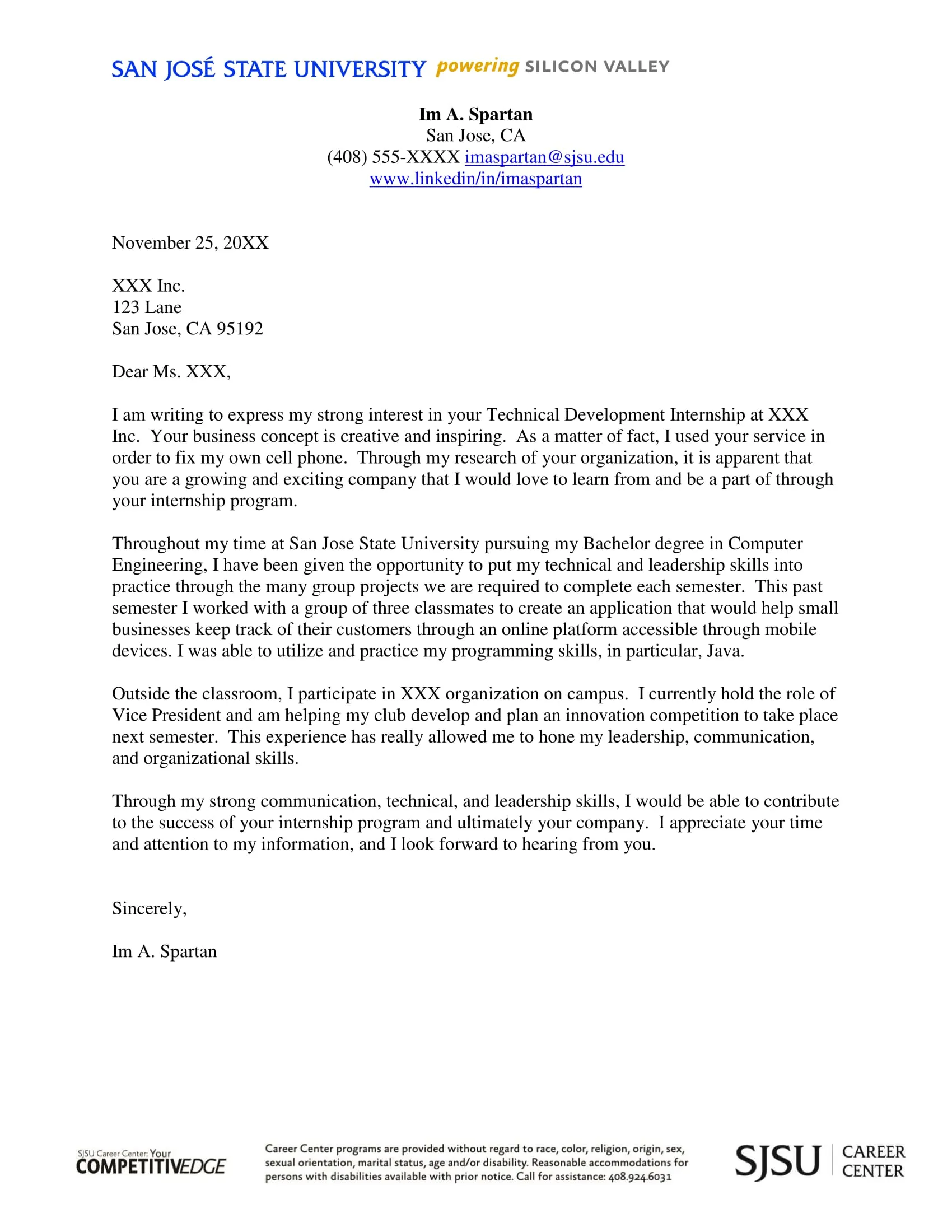
Always end your cover letter by thanking the reader for their time and consideration. This demonstrates your professionalism and respect for their time. A simple ‘Thank you for your time and consideration’ is sufficient. Be sure to spell the hiring manager’s name correctly and use the appropriate salutation. End with a professional closing, such as ‘Sincerely,’ ‘Best regards,’ or ‘Thank you.’ This final touch of courtesy shows your appreciation for the opportunity and leaves a positive impression.
